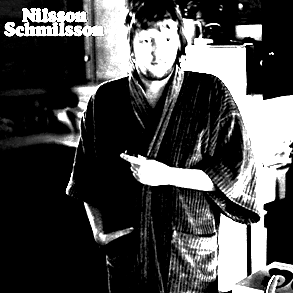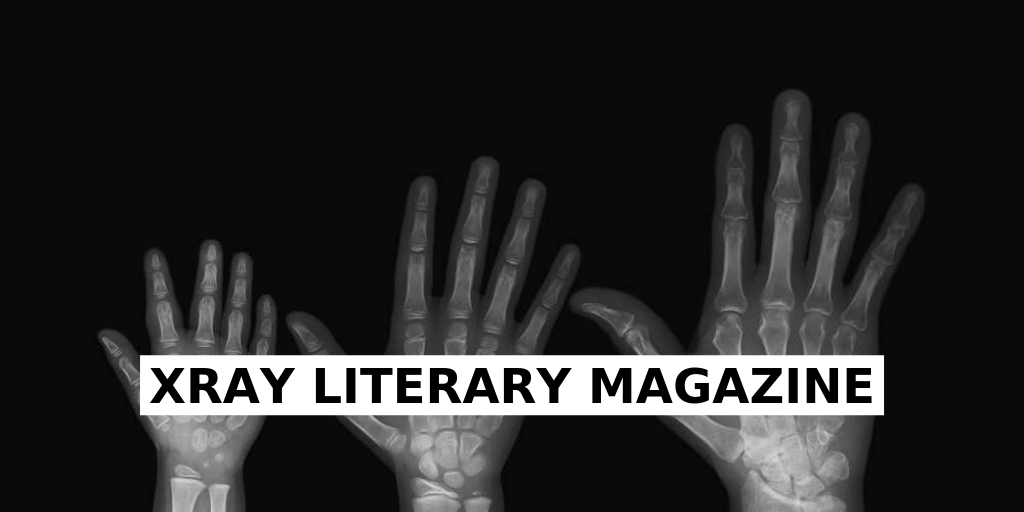I was outside on my street watching an apartment building on fire. I was watching it with the people who lived in that building, the people who’d left it. At three floors, it wasn’t a big apartment building, but it was a big fire. It was crackling, and flames were shooting out of windows and smoke was filling the night sky.
I looked at everybody. It was nighttime when the fire started, and so you could see these snapshots of how people were living inside their homes. A couple wore rumpled office clothes paired with sweatpants, caught between two routines. There was a guy in a misbuttoned janitor outfit. There was a family with four little kids, crying in mismatched pyjamas. The parents looked lifeless and hollowed out, leaning against each other like dead trees. There was even a guy who looked like Harry Nilsson on the cover of Nilsson Schmilsson, standing lost and gently wasted in a bathrobe. Instead of a hash pipe he was holding this big lamp.

That was the other thing too; people had brought all this stuff with them. But it’s hard to figure out what’s important when you are trying to not die in a fire. Like honey grab that toaster, we need to get out of this fucking building on fire. And then you’re in this rushed procession, everyone wanting to move fast but there’s so many of them that they can only move slow, this urgent slowness, bodies pushed out of hallways like toothpaste, and you’re holding a toaster. Or you grab a box of shit you never unpacked from when you moved in. Or your daughter’s favourite stuffed toy but it’s the wrong one, and now she’s crying on the street and her memories are covered in flames. Outside we were huddled together, we could all feel the warmth.
Finally we heard sirens. A fire truck honked at us because we were all standing in the street and firefighters started to get off and we moved to the crabgrass of the lawns of the row of houses across the street from the building. There was one house where the shutters were drawn though, and it looked like nobody was home. That house was my house. These people were on the street because the building they lived in was on fire. I was here because I wanted to breathe in a new kind of smoke. I was inhaling their lives. The family pictures, the drawers of junk mail, the jars of small change, the piles of unfolded clean laundry, the unworn jewelry passed down from mom, the overdue bills and lost TV remotes, the blankets, the books, the old vcrs, the stuff, all of it smoke rings floating skyward. These people didn’t know that instead of living they’d been gathering kindling.
Another firetruck and a couple of ambulances came, and I got to watch people at work. Some firefighters were spraying the building with water while other firefighters were going into the building. I didn’t know what was happening but it looked coordinated. It made me think about how when you are a firefighter nobody knows when you are doing a bad job. Like there are people who are bad at their jobs everywhere, so there must have been people who were bad at fighting fire. Firefighters with dull axes and weak muscles, firefighters who got lost on the way to a fire, firefighters who dropped old ladies onto the floor like they were heavy groceries – all heroes. As long as you were showing up to the fire, you were doing pretty good. As long as you do did some baseline firefighting shit, low expectations were their own reward.
I had to pay attention now because a quiet came over the crowd. A lull accompanied by craning necks. I looked with them and I saw it; I saw a life being saved.
The front doors of the apartment were being opened, and there was a firefighter cradling a man in his underpants. The man was almost hairless, heavy – his body a series of soft, round shapes folding in on each other. His skin was reddened, splotchy. It looked like the firefighter was carrying a newborn baby, the man was that helpless, and for all of his size he was being carried with such ease and tenderness.
The man was crying, and he was talking to the firefighter. “Please let me die,” he said. “Please let me die.” His sadness was baby-like too. It was pure and unsullied. “Please,” he said. “I want to go back in there, please. Please.” And the man did not protest further as the firefighter carried him to the paramedics, who strapped him down into a gurney. We all watched this.
I had never seen a life saved before!
We stayed to see what would happen next, but in the end the fire just died. The firefighters were turning away people who wanted to go back, and the crowd dispersed, formless – in the end just more smoke, only I no longer wanted to inhale. Watching that man’s life being saved was akin to saving it myself. I felt a fullness. I walked and walked, directionless, heroic in my wandering.
The streets were broken up by dogshit on neighbours’ lawns, by gum dotting the sidewalk, by shards of broken glass, unclaimed garbage, the smell of marijuana from backyards and balconies. There were signs for missing pets – Charlie and Waldo and Blackie, which was the name of a black cat, which was questionable. The sounds of porch conversations and laughter, of hazy bass reverberating through houses, the sounds of nothing, of my footsteps, of crickets. I felt infused with a sense of community.
There was a lawn of knee-high weeds, overgrown from neglect. I saw a letter on the door of this house, and I walked up to the door and read “JANET ITS YOUR NEIGHBOURS PLEASE CUT YOUR GRASS,” and Janet, you wonder, you holy ghost, I hope you never change. Please let me die? And miss Janet cut the lawn?
It was funny how often you could see into the houses. Most windows were closed off, but there were so many left uncurtained, unshuttered, wide open. The green snatches of plants, or of bookshelves, or of unadulterated, unchanged 1970s decor. Of giant flatscreen televisions, shooting out images of big faces mouthing words at each other, of news anchors commenting on the moving pictures in the box adjacent to them, of tiny men playing baseball, of netflix menus. There was also the shock of people – an old man moving in his kitchen, a man and woman putting food into their open mouths, of a woman adjusting a stereo, adjusting a bra. All obstructed, cut off, edited to fit the aspect ratio of windows; the 16:9 of living spaces beamed outwards. Pause – that couple asleep on their couch, crashed and leaning against each other under the glow of a screen paused on the option to “Continue watching.” I stood and thought to myself about how even dog shit left on someone’s lawn was life. Even broken beer bottles on the street came from living. From drinking that beer and making the earth your garbage. I checked my phone, saw angry messages, looked up and saw that the sleeping heads were now awake and looking at me.
Cut to curtains closed ineptly, a man opening the door, coming fast and saying “What the fuck’s your problem?”
I tried to talk about how full of life everything was. How even Janet was trying her best, or not, but it didn’t matter as long as she was still here. I couldn’t think of how to start, so I asked if he heard about the fire. “Fuck you!” he told me. He looked like he was going to punch me so I ran down the street.
I was sweaty and out of breath when I got to a park entrance. I was lost, but I had my phone so I wasn’t really lost. An unused playground gave way to an unused soccer field, and a path cut through the field, leading to a small forested area that was dwarfed by three apartment complexes. The trees swayed, emasculated, and I walked towards them.
It felt nice to not know where I was.
The forest was lit erratically by my phone flashlight. There was a man-made structure, a long sloping tree branch used as the spine for kind of tee-pee made of found branches. I looked inside and there was nothing. I swatted at mosquitoes and thought about living in here. Thought about being a caveman. Watching fire and living in the dirt. Scrawling madness onto walls. There was a crackling of branches and a flash of red, a soft thumping noise, a cardinal twitching on the ground.
The wing was bent obtuse, wrong, and there was more red than just plumage.
The bird was making noises and I was the only one around to hear its song. I didn’t know if it was dying or what. The bird was flapping on the ground but it couldn’t get up. It stopped and was still. I bent down to look at it. “I can save you,” I said.
I held it in my hands and for a moment it did not stir. It was so light. The red in my hands was almost weightless – almost nothing.
I started to get up and what was in my hands bucked and thrashed. The bird started to pick at me and bite, and I dropped it on the ground. It lay there hurt and screaming. I could see now that there was a lot of blood. If the bird was dying I didn’t know if this was a list of grievances or a confession or a final wish. I tried to pick it up again and it bit at me. It hopped on the ground and fell for a final time.
Its squawking died out, finally, and I was able to hold it in my hands once more.
If the bird was dying I didn’t know what to do.
In the dirt of the wooden structure, I dug a tiny hole.
After that I walked home. The shutters were still closed. I slid my key into the lock and opened the door. I turned on the hallway light and my wife appeared by the stairs. She was wearing an old sweatshirt, baggy and stained. She smelled like sleep and milk. Her upper lip was tight and the lines around her mouth formed a sad shape, and she wanted so badly to shout, but she knew she could not. She had to whisper. She had to whisper that I was a lazy husband and a bad father, and where was I, what right did I have to be such a disappointment. This was anger without catharsis. You can slam the curtains shut, but it’s just fluttering air. Her eyes looked so hurt. So tired. So sad. I couldn’t focus on her words anymore, the harsh sibilants that couldn’t rise to the level of a shout. And even though she was careful, there was a crying from upstairs and I was saved. My wife looked at me a final time and floated back up the stairs.
I grabbed a beer from the fridge and drank it in front of the television as sports highlights played in a loop at low volume. The television flickered and when I woke up no light crept through the shutters. I put the bottle on the kitchen counter and I crept up the stairs like a fugitive. Upstairs I opened our daughter’s bedroom door and looked down at our sleeping baby. I picked her up and rocked her in my arms.
I am saving you, I thought.
Please let me die.
I am saving you.

